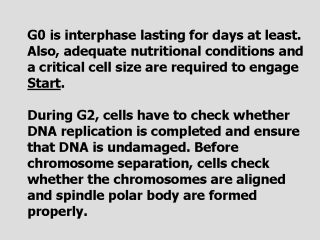| front |1 |2 |3 |4 |5 |6 |7 |8 |9 |10 |11 |12 |13 |14 |15 |16 |17 |18 |19 |20 |21 |22 |23 |24 |25 |26 |27 |28 |29 |30 |31 |review |
 |
These cell-cycle
checkpoints are the mechanisms that govern the order of the cell-cycle
events. Mitosis is blocked when DNA duplication is incomplete or is damaged.
The second checkpoint concerns the controls which operate during the Cyclin-dependant kinase (CDK) regulates mitosis in fission yeast. A number of proteins are required for cell-cycle progression. Among these, Cdc2 protein kinase (CDK1) plays a central role. Loss of Cdc2 kinase activity arrests cells both before Start in G1 and in late G2 before the M phase, and dominant forms of Cdc2 advance entry into mitosis. Furthermore, Cdc2 is essential for viability. Initiation of DNA synthesis and nuclear divisions are attributed to the activity of a single CDK catalytic subunit encoded by cdc2+. The equivalent gene in budding yeast is CDC28. People in the current literature are using different names for the same thing in a different host, and the same name--E2--for very different things. After passing Start, Cdc2 becomes complexed with B-type cyclins Cdc13 and Cig2 and the Cdc2 complex is phosphorylated on tyrosine-15 by both the Wee1 and Mik1 tyrosine kinases. This tyrosine phosphorylation is maintained until the onset of mitosis. Dephosphorylation of this residue is carried out by the Cdc25 tyrosine phosphatase. |